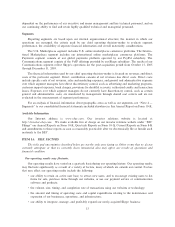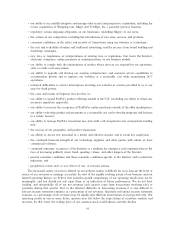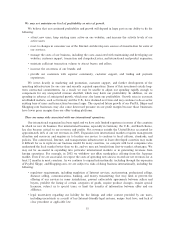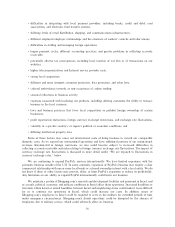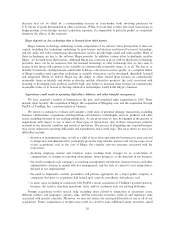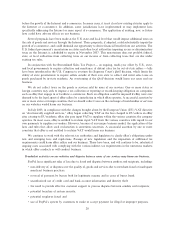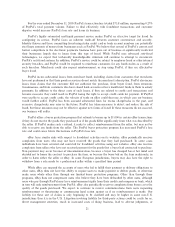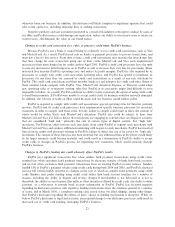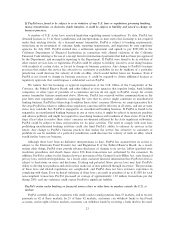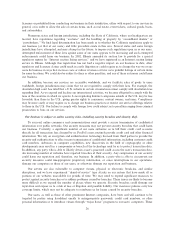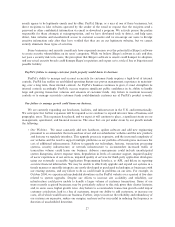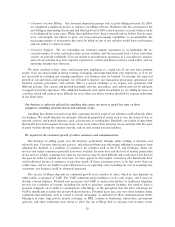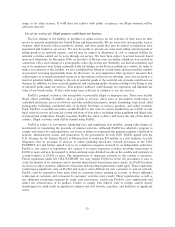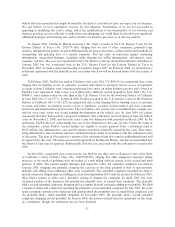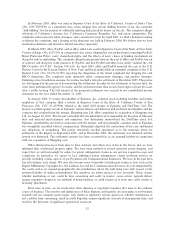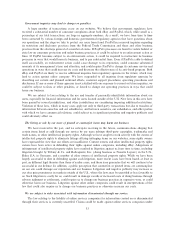eBay 2005 Annual Report Download - page 27
Download and view the complete annual report
Please find page 27 of the 2005 eBay annual report below. You can navigate through the pages in the report by either clicking on the pages listed below, or by using the keyword search tool below to find specific information within the annual report.If PayPal were found to be subject to or in violation of any U.S. laws or regulations governing banking,
money transmission, or electronic funds transfers, it could be subject to liability and forced to change its
business practices.
A number of U.S. states have enacted legislation regulating money transmitters. To date, PayPal has
obtained licenses in 33 of these jurisdictions and interpretations in nine states that licensing is not required
under their existing statutes. As a licensed money transmitter, PayPal is subject to bonding requirements,
restrictions on its investment of customer funds, reporting requirements, and inspection by state regulatory
agencies. In July 2005, PayPal entered into a settlement agreement and agreed to pay $225,000 to the
California Department of Financial Institutions in connection with alleged violations of the California
Financial Code relating to the use of a receipt form for international payments that had not been pre-approved
by the Department, and incomplete reporting to the Department. If PayPal were found to be in violation of
other money services laws or regulations, PayPal could be subject to liability, forced to cease doing business
with residents of certain states, or forced to change its business practices. Any change to PayPal's business
practices that makes the service less attractive to customers or prohibits its use by residents of a particular
jurisdiction could decrease the velocity of trade on eBay, which would further harm our business. Even if
PayPal is not forced to change its business practices, it could be required to obtain additional licenses or
regulatory approvals that could impose a substantial cost on PayPal.
We believe that the licensing or approval requirements of the U.S. Office of the Comptroller of the
Currency, the Federal Reserve Board, and other federal or state agencies that regulate banks, bank holding
companies, or other types of providers of e-commerce services do not apply to PayPal, except for certain
money transmitter licenses mentioned above. However, PayPal has received written communications in the
past from state regulatory authorities expressing the view that its service might constitute an unauthorized
banking business. PayPal has taken steps to address these states' concerns. However, we cannot guarantee that
the steps PayPal has taken to address these regulatory concerns will be effective in all states, and one or more
states may conclude that PayPal is engaged in an unauthorized banking business. If PayPal is found to be
engaged in an unauthorized banking business in one or more states, it might be subject to monetary penalties
and adverse publicity and might be required to cease doing business with residents of those states. Even if the
steps it has taken to resolve these states' concerns are deemed sufficient by the state regulatory authorities,
PayPal could be subject to fines and penalties for its prior activities. The need to comply with state laws
prohibiting unauthorized banking activities could also limit PayPal's ability to enhance its services in the
future. Any change to PayPal's business practices that makes the service less attractive to customers or
prohibits its use by residents of a particular jurisdiction could decrease the velocity of trade on eBay, which
would further harm our business.
Although there have been no definitive interpretations to date, PayPal has assumed that its service is
subject to the Electronic Fund Transfer Act and Regulation E of the Federal Reserve Board. As a result,
among other things, PayPal must provide advance disclosure of changes to its service, follow specified error
resolution procedures and absorb losses above $50 from transactions not authorized by the consumer. In
addition, PayPal is subject to the financial privacy provisions of the Gramm-Leach-Bliley Act, state financial
privacy laws, and related regulations. As a result, some customer financial information that PayPal receives is
subject to limitations on reuse and disclosure. Existing and potential future privacy laws may limit PayPal's
ability to develop new products and services that make use of data gathered through its service. The provisions
of these laws and related regulations are complicated, and PayPal does not have extensive experience in
complying with them. Even technical violations of these laws can result in penalties of up to $1,000 for each
non-compliant transaction. PayPal processed an average of approximately 1.32 million transactions per day
during 2005, and any violations could expose PayPal to significant liability.
PayPal's status under banking or financial services laws or other laws in markets outside the U.S. is
unclear.
PayPal currently allows its customers with credit cards to send payments from 55 markets, and to receive
payments in 42 of those markets. In 25 of these 42 markets, customers can withdraw funds to local bank
accounts, and in eight of these markets customers can withdraw funds by receiving a bank draft in the mail.
23


